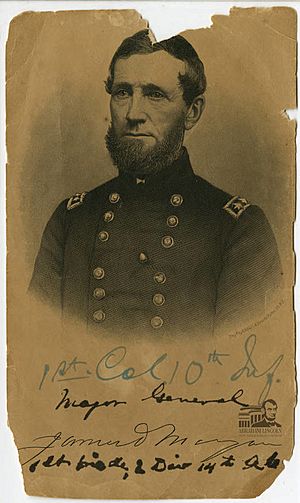James D. Morgan facts for kids
Quick facts for kids
James Dada Morgan
|
|
|---|---|
 |
|
| Born | August 1, 1810 Boston, Massachusetts |
| Died | September 12, 1896 (aged 86) Quincy, Illinois |
| Place of burial |
Woodland Cemetery, Quincy, Illinois
|
| Allegiance | Union |
| Service/ |
United States Army Union Army |
| Years of service | 1848–1849; 1861–1865 |
| Rank | |
| Unit | 1st Regiment Illinois Volunteers 10th Illinois Infantry Regiment |
| Commands held | 10th Illinois Infantry Regiment 1st Brigade, 2nd Division, XIV Corps 2nd Division, XIV Corps |
| Battles/wars | Illinois Mormon War Mexican–American War American Civil War |
James Dada Morgan (born August 1, 1810 – died September 12, 1896) was an important person in American history. He was a merchant sailor, a smart businessman, and a brave soldier. During the American Civil War, he became a Union General.
General Morgan led a group of soldiers called an infantry division. He played a key role in some of the last big battles of the Civil War in the western United States.
Contents
Early Life and Adventures
James Dada Morgan was born in Boston, Massachusetts. When he was younger, he worked as a merchant sailor. This job took him on many adventures. Once, his ship, the Berkley, caught fire. He had to spend two weeks in a lifeboat, which must have been a very tough experience!
In 1832, James married Jane Strachan in Boston. They had three children together. Two of their sons, James and William, grew up to be adults. Sadly, Jane passed away in 1851.
In 1834, James and his family moved to Quincy, Illinois. There, he started a business making barrels. He also joined a local military group called the "Quincy Grays" in 1837. Later, he became a grocer and worked in a pork packing business for 25 years.
Early Military Service
Because he was part of the Quincy Grays, James Morgan led a group of soldiers during the Illinois Mormon War. This was a local conflict in Illinois.
Later, when the Mexican–American War started, Morgan's unit joined the U.S. Army. They fought with General Zachary Taylor in Mexico. James Morgan showed great bravery during the Battle of Buena Vista. For his actions, he was promoted to Major. After the war, he went back to his businesses in Quincy.
Service in the Civil War
When the American Civil War began in 1861, James Morgan was ready to serve again. He was made a Lieutenant Colonel in the 10th Illinois Infantry Regiment. Soon after, he was promoted to Colonel.
In 1862, he was given command of a brigade (a large group of soldiers). He led his brigade in important battles like the Battle of Island Number Ten and the Siege of Corinth. Because of his leadership, he was promoted to Brigadier General in July 1862.
Key Campaigns and Battles
General Morgan's unit was later moved to the Army of the Cumberland. He commanded a brigade under General George Henry Thomas. During the Stones River Campaign, his division was left behind to guard Nashville.
He also served in the Chattanooga Campaign. Here, he led a brigade in the XIV Corps and fought in the Battle of Missionary Ridge.
General Morgan played a big part in the Atlanta Campaign. During the Siege of Atlanta, he took command of the 2nd Division of the XIV Corps. He led this division bravely in the Battle of Jonesborough and during Sherman's famous March to the Sea.
Battle of Bentonville
One of his most important moments was at the Battle of Bentonville during the Carolinas Campaign. General Morgan's division held the right side of the Union Army's battle line. He was the only division commander who built strong defenses for his troops.
When the Confederate army attacked, Morgan's position was almost surrounded. Other Union forces were falling back, but his division held strong, even when attacked from three sides. His bravery and skill earned him praise from his commanders. He was promoted to Major General in March 1865. General Morgan was known as a dependable and down-to-earth leader. He left the volunteer service in August 1865.
Life After the War
After the Civil War, James D. Morgan returned to his life as a banker and businessman. He became the Vice President of the First National Bank in Quincy, Illinois. He was also a director for several other companies, including a railroad and a hotel. He helped start and lead the Quincy Gas company. He also worked as the treasurer for the Illinois Soldiers' and Sailors' Home, which helped veterans.
In 1859, James D. Morgan married Harriet Evans. They did not have any children together.
General Morgan passed away on September 12, 1896, from a serious illness called Lupus. He is buried in Woodland Cemetery in Quincy, Illinois.
See also
- List of American Civil War generals (Union)
 | Delilah Pierce |
 | Gordon Parks |
 | Augusta Savage |
 | Charles Ethan Porter |

